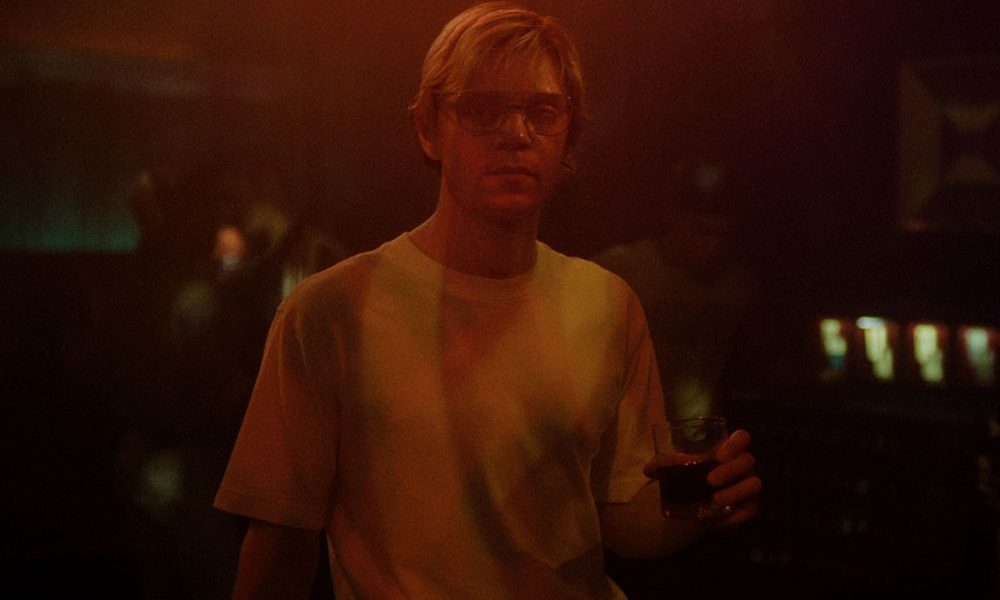
Alexandra Billings has been a pioneering trans performer several times over, but she tells us that her recurring role as Inspector Ainsley Lowbeer in “The Peripheral” – Amazon Prime’s series adaptation of William Gibson’s 2014 book of the same name – is a more personal first for her.
“I love science fiction! This is really my bag, and I’ve never done anything like it before!”
Created by Scott B. Smith, who co-executive produced the show alongside “Westworld” creators Jonathan Nolan and Lisa Joy, the show is a mystery-thriller set not just in one future but in two. Beyond the depressingly prescient dystopian one inhabited by protagonist Flynne Fisher (Chloë Grace Moretz) lies another, from which the surviving remnants of humanity employ advanced computer technology to reach back and alter the past. The stakes are high – there’s an apocalypse involved — and a complicated, “Black Ops”-style secret war going on between factions struggling for control makes them even higher. Even for someone who doesn’t look for these things, the allegorical comparison with our own world is impossible to miss; but then science fiction, done right, has always been a prime genre for making social, cultural, and political commentary – and author Gibson, widely credited with creating the whole “cyber-punk” sub-genre, knows how to do it right.
Billings recently spoke with the Blade about the show, among other things. Our conversation is below:
BLADE: It’s refreshing to see you in something like this. We’re not used to seeing such strong representation in these kinds of stories.
ALEXANDRA BILLINGS: Usually, if trans characters were in sci-fi in the past, we were plugged in – they were cisgender characters that trans people played and then they turned trans. But Lowbeer is written as a trans woman. That was extraordinary, and it was thrilling to me.
BLADE: She’s a very strong presence.
BILLINGS: She’s kind of a guide, and she also has great power – not mystical power, or magical, but intellectual. And that’s one of the wonderful things about this show that I want to stress – it’s very female-centric, very female-heavy. There’s gender identity that is addressed, there are women of color that have great power and great strength and intellect. These are smart, witty, competent, capable women. No female depends on any other power except their own to be able to survive in the world of this story, and I think that matters, too.
BLADE: Did you ever imagine you would be playing a part like this in a mainstream Hollywood project?
BILLINGS: Oh no, God, no. When I first came to Hollywood, there were five of us, basically, me and Candis and Laverne and Trace Lisette, and a couple of other people, and that was it. Every time there would be an audition for a trans person – which was usually one of us in the hospital, or going to the hospital, or getting ready to go to the hospital, or something that had to do with the hospital – we would always meet each other. We finally just formed a little brunch club, we were like, ‘Let’s just get together after the next audition and go out. We might as well have food.’
Back then, there was just no concept of the transgender experience, because trans people were not writing any of these shows. You can’t have someone who’s never been through a lived experience pretend that they’ve lived that experience, it doesn’t make any sense. Now, with more trans writers, more trans producers and showrunners in Hollywood, things are starting to change. But this was a shock. I was shocked when I heard about this character, and really shocked when I read the script. It really is brilliant.
BLADE: That’s just one aspect of the show that feels forward-thinking. Don’t you think the whole concept of a future world influencing our present day really strikes a chord with the rise of a younger generation that is primed and ready to take the wheel?
BILLINGS: I think what this show does is that it shines a light. It’s a reflection of a human experience that is happening politically, globally, which is the takeover of righteousness, of our idea of what is helpful to the community – and what isn’t.
We have a whole shift that is happening in the United States right now, which is a younger generation – the Gen Zs – saying ‘I don’t like the way a lot of the country talks about female empowerment, I don’t like what you’ve done to take away autonomy for female bodies or choices, I don’t like the way you talk about gender. There’s a whole bunch of stuff that I don’t like, so I want you out.” It’s why this ‘blue wave’ happened – because of them. There was this whole conservative movement before the midterms that was supposed to, like, take over, and it just fizzled out and died. I think this is just the tip of the iceberg.
BLADE: Let’s all hope you’re right. There’s such a disheartening backlash in some pockets of our country over queer rights in general. We still even have fight to preserve marriage equality.
BILLINGS: We have this whole group of people out there talking about ‘traditional marriage.’ That means nothing. I want to tell them, ‘Nothing exists inside that container – how far back do you want to go when you say ‘traditional’, do you still want to be able to vote? Stop being an idiot.’
BLADE: As someone on the battle lines, what would you like to see for the future of trans representation?
BILLINGS: We need to begin to have conversations that are so normalized about the transgender experience that we no longer talk about the transgender experience. We need to have an over-abundance of trans and nonbinary stories, of trans and nonbinary writers, producers, directors, creators, innovators, telling their own stories – so many of them that the cis-white-heteronormative patriarchy finally needs to step aside. That’s what needs to happen.
BLADE: That seems like a hard sell to the people still holding onto the reins of power.
BILLINGS: When I say things like that, all of Hollywood takes a huge intake of breath. They think it’s impossible. They can’t conceive of that to be true because they think, ‘What about MY stories? What about me?’ As if there was a shortage of those.
Look at Candace Cameron, who quit Hallmark and just came out and said, ‘I’m going to honor traditional marriage on my new channel, and those are the stories I’m going to tell.’ What she’s saying is, ‘These two heteronormative cisgender people are the norm, that’s what we’re going to draw a circle around. Those are the only people that are going to be represented, that’s what we’re telling every single queer youth on the planet is the thing to be.’ That’s the message? So everybody else needs to move aside? That doesn’t make you a trailblazer, it makes you a coward.
BLADE: There’s another “C word” that comes to mind.
BILLINGS: (Laughing) That too.
You can watch “The Peripheral” on Amazon Prime.








